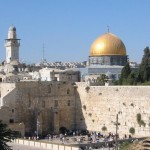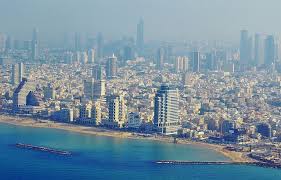 This summer, the week before Israel and Gaza began flinging rockets at each other, I found myself looking at the Mediterranean Sea from my hotel balcony in Tel Aviv. I had come to the Holy Land to visit Hewlett-Packard’s Indigo printing division, the company responsible for our new 30″ wide Indigo digital press. This extraordinary piece of technology transmits art work from a computer and prints it onto plastic without using printing plates. Changeovers between jobs happen with the click of a mouse. Digital has been around for many years, but this is the first press H-P has built specifically to print on plastic. Lucky for us, we are the beta site for the new machine. Which is why I was gazing at Tel Aviv’s beach.
This summer, the week before Israel and Gaza began flinging rockets at each other, I found myself looking at the Mediterranean Sea from my hotel balcony in Tel Aviv. I had come to the Holy Land to visit Hewlett-Packard’s Indigo printing division, the company responsible for our new 30″ wide Indigo digital press. This extraordinary piece of technology transmits art work from a computer and prints it onto plastic without using printing plates. Changeovers between jobs happen with the click of a mouse. Digital has been around for many years, but this is the first press H-P has built specifically to print on plastic. Lucky for us, we are the beta site for the new machine. Which is why I was gazing at Tel Aviv’s beach.
I had flown to Israel to learn more about the machine prior its arrival. I admit that a few days earlier I had equivocated about coming. Israeli soldiers had flooded into the Palestinian cities of Hebron and Ramallah in the occupied West Bank looking for three Jewish teens who had disappeared. They also took the opportunity to arrest members of Hamas, the Islamic movement opposed to the Occupation. Palestinian youths reacted angrily to the arrests, and rioting broke out across the region. I wrote one of my H-P contacts asking if we should still come. Having covered the region as a journalist many years ago I knew how such moments could spin out of control so I worried about the safety of those traveling with me. His reply chided me for even thinking about not coming and said that the streets of Tel Aviv were safer than Paris.
So off to Israel I went with our business partners and two senior colleagues. The trip astounded me on many levels. I have never been in a foreign city where I felt like I had never left home. Tel Aviv must be one of the most cosmopolitan cities in the world. Our meals seemed to encompass the globe, including one evening where we ate Cuban food. Our hotel’s beach turned out to be where gay’s congregated to sun bathe, a group that would not show themselves in most of the Middle East. English was widely spoken and news easy to come by. Plus so many Israelis seemed connected to the United States. Most of our H-P contacts had lived there for a few years or had family in the U.S. and perhaps even gone to school stateside.
But I caution colleagues I travel with not to assume the places we visit are like home. If you do, you miss nuances that could later effect doing business, or simply end up missing the world’s diversity. Israel proved no different. An hour drive by car to Jerusalem transported you back into the beginning of time, with devout religious from the three major faith traditions jostling each other in the Old City’s alleys. Islam’s second holiest mosque, the Dome of the Rock sits right above the wall of the Jewish second temple which is only a few minutes from the Church of the Holy Sepulchre which stands on the ground legend says Jesus Christ died. All the pilgrims offering their devotions reminded me more of the 16th century than the 21st century. Tel Aviv seemed far longer than an hour away.
Later this summer my son and I saw a play in London entitled “Holy Warriors”. The piece ponders how history might have been different if Richard the Lionheart of England had chosen to visit Jerusalem at the conclusion of the third crusade, when he forged a truce with the great Islamic chief Saladin that opened the city to Christian pilgrims and merchants. Perhaps the two religions would have cemented a lasting peace. Instead, Richard leaves for Europe, unwilling to enter a city still under Muslim administration. Down through the years the play takes us to today, when Christians, Muslims and now Jews battle throughout the region, with much of the conflict centered in historic Palestine.
I saw hints of the conflict on the drive back to Tel Aviv. New Jewish settlements dotted the hills around Jerusalem, encroaching on the eastern half of the city once controlled by Palestinians. A high wall zig-zagged across the landscape, built by the Israeli government trying to protect its cities from suicide bombers. One settlement I saw seemed completely surrounded by barbed wire. Meanwhile, out of sight but not out of mind, a few miles to the east the IDF continued its search for the teens, which dominated the news during our visit.
The tensions ate at me. As an Irish-American I know the history of my own people, their land stolen by the British, their religion and language banned. My family arrived in the 1920s following a bloody War of Independence against British soldiers partly drawn from prisons. I could not but feel some sympathy for the Palestinians on the other side of that long, snaking wall. On the other hand, the murder of the three teens, found dead a few days after we left, drove home just how wide a gulf exists between the two sides. What could be gained by such brutality?
I’m saddened Tel Aviv isn’t Paris after all. I’m glad to have gone and happy to have left a week before the Hamas rocket attacks started. I formed a much deeper appreciation for what H-P has achieved in digital printing. The string of high-tech companies that surround the city point to a vibrant economy firmly planted in the 21st century. But the wall, the occupation, the rockets, the clashes in the West Bank point to tensions inherited from a much earlier time.
The play Cormac and I saw concludes with Richard in Purgatory, having to witness the bloodshed spilled over the centuries in part thanks to his unwillingness to bury the hatchet. Finally, he is given another chance. He can enter Jerusalem, or not. If he decides not to, the bloodshed goes on and he goes to Hell. If he decides to set foot in the Old City, peace comes and he enters Heaven. Of course he cannot bring himself to enter Jerusalem, leaving me to wonder if cosmopolitan Tel Aviv will ever find itself free from the troubles conjured by that ancient city.
Tel Aviv, Israel


You can certainly see your expertise in the article you write.
The world hopes for more passionate writers like you who are not afraid to
say how they believe. All the time follow your heart.
Thanks for the piece, Kevin. Interesting how geopolitical events and history intersect with your personal world, which I suppose is the principal point of the article.